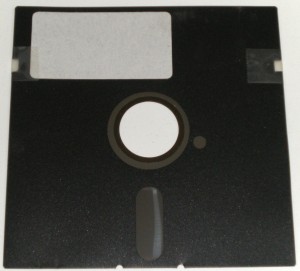 |
| 5.25", enough to satisfy any man circa 1987 |
That was the PC world. There was also the console market, which was making huge advances in technology. Sinclair research had started it all off with the ZX82, or ZX Spectrum (referring to the colour display). This was a single unit 8-bit computer with 16 - 128 KB RAM. In the late 80's, when my Dad bought one, the top of the range model also had a floppy drive attached for faster game loading times. Other models were restricted to loading games with cassettes. If you are old enough to remember the dreadful noise that accompanied the long loading times, then you will probably share with me the anger at waiting until the end to find that the game had not loaded properly, and all you had was an error on your TV. Rewind the tape, and start again - there goes the afternoon.
 |
| Top of the range awesomeness, 1987-1990 |
 | ||
| Black, white, yellow and blue. |
Because of this, games were not very long. Levels might take around 5 minutes to complete, and there might be 10 levels (unless you are playing a game that goes on until you can't play anymore, like telly tennis or something else cutting edge). Games were played purely for fun, and there was absolutely no danger of anyone thinking it was realistic. I was around 6-7 years old when I was playing this game, and at no point did I think it would be a good idea to start some gang warfare at the local train station. Simple times.
There were a lot of games for the Spectrum, plus you could even write out the code supplied in books to make your own games - writing in BASIC, which looks something like this:
READY
10 PRINT "HELLO, WORLD!"
20 GOTO 10
RUNExcept there were a few more lines for the games. Sadly, after spending hours writing it all out (using the novice 2 finger approach) and typing RUN, the program would compile and error at line 220, fail, and all the code would be lost. Occasionally it would work, which would be good fun for several minutes, but not as good as the shop-bought games.
 |
| <insert deity> bless Sir Alan Sugar |
 One of the stand-out games I did own for the 464plus was Treasure Island Dizzy. I played it and played it and never got bored. It is all about an egg with boxing gloves that runs around an island trying to solve puzzle and get on a boat to go home. It was fantastic. If you died, you went back to the beginning, which sometimes meant losing hours of play - but I would just start again. This was the first game I played that made me think - it wasn't just about jumping over pits or killing tough guys, you had to work out how to use the things you picked up in order to get to the next screen.
One of the stand-out games I did own for the 464plus was Treasure Island Dizzy. I played it and played it and never got bored. It is all about an egg with boxing gloves that runs around an island trying to solve puzzle and get on a boat to go home. It was fantastic. If you died, you went back to the beginning, which sometimes meant losing hours of play - but I would just start again. This was the first game I played that made me think - it wasn't just about jumping over pits or killing tough guys, you had to work out how to use the things you picked up in order to get to the next screen.Gaming back in my childhood was fun. When I finished playing, I would go out and climb trees, cycle with friends, dig holes or throw sticks. I didn't have long conversations about the games, or spend any time thinking about how to get to the next level or defeat the next boss. I certainly didn't feel the need to check my score against other player's scores. If there was any other game playing, it was at the arcade for 10p a go.
But that is for another time...
Yes they were fun games. Ire ember Renegade very well. And Manic Miner, which I think was the original platform game!
ReplyDelete